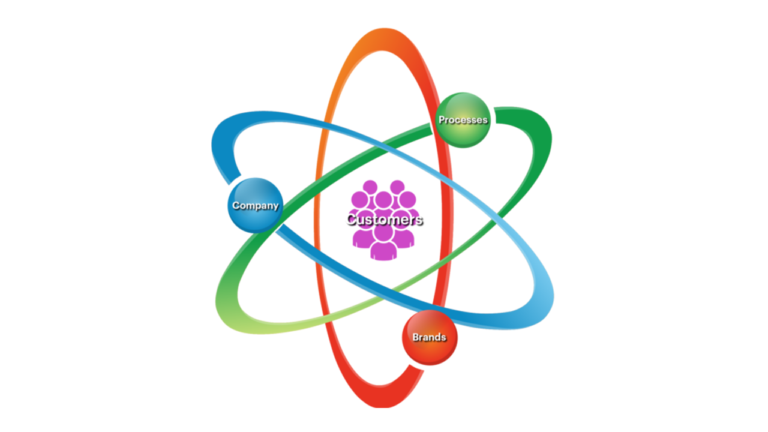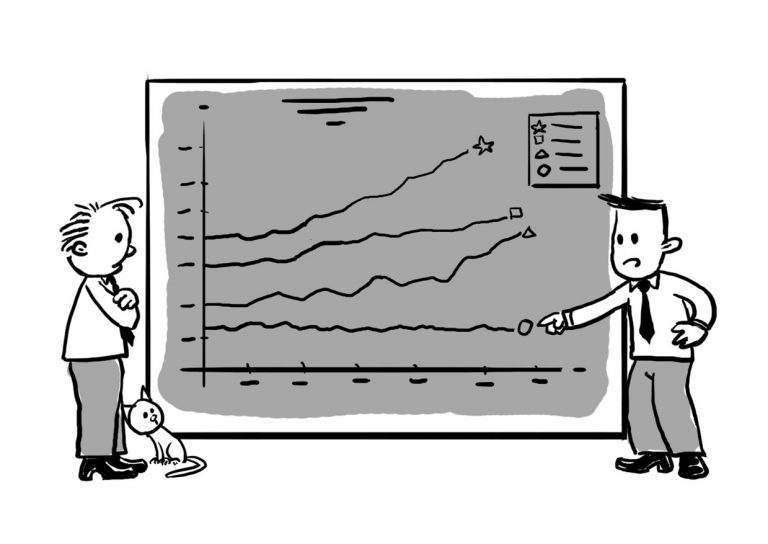All CEOs face many challenges, perhaps those of small and mid-sized companies more so than others. However, the current data-rich environment offers an enormous untapped potential for SMEs. Let me explain.
Today’s technically advanced and data-rich environment makes the strategic use of data a crucial element for success. While many companies recognise the importance of its leverage for marketing purposes, an often overlooked aspect holds immense potential: the comprehensive and superior use of customer-centric data. This is what I want to cover in this post.
If you would rather listen than read:
Understanding the Potential for SMEs to Use More Customer-Centric Data
Superior use of customer-centric data means going beyond basic data collection and analysis to integrate customer insights into every facet of a business. This holistic approach uses data to enhance product development, service enhancement, operational efficiency, and strategic planning.
Let’s look into each of these in more detail.
Why the Superior Use of Data Matters
1. Personalised Customer Experiences: Superior data utilisation helps all organisations, especially SMEs, create personalised experiences that resonate with individual customers.
Businesses can tailor their offerings, communications, and engagements to create meaningful connections by understanding customers’ preferences, behaviours, and needs. According to a report by Epsilon, 80% of customers are more likely to make a purchase from a brand that provides personalised experiences.
2. Predictive Insights for Proactive Strategies: Leveraging data allows SMEs to anticipate trends and predict future behaviours.
This foresight enables proactive strategies, such as developing new products or services that address emerging needs or adjusting marketing tactics to stay ahead of the competition. Gartner predicts that by 2025, AI-driven businesses will be able to capture up to $2.9 trillion in business value.
3. Enhanced Decision-Making: Data-driven decision-making eliminates guesswork and reduces the risk of costly mistakes. SMEs can make informed choices based on concrete evidence, leading to more effective resource allocation and improved outcomes. According to McKinsey, data-driven organisations are 23 times more likely to acquire customers, six times more likely to retain customers, and 19 times more likely to be profitable.
4. Operational Efficiency: Analysing customer data has huge potential for SMEs to identify inefficiencies and streamline processes. This enhances productivity, contributes to cost savings, and improves the overall customer experience. A Forrester study found that organisations leveraging data effectively see a 10% reduction in operational costs.
If you are an executive who believes you have untapped potential in your own organisation and would like to discuss your current challenges in data usage, innovation, or marketing, then why not CONTACT US? In a 30-minute CALL, you will walk away with at least three suggested actions immediately impacting your business.
Transforming Marketing with Superior Data Utilization
The power of superior data use cannot be overstated for marketing heads. It revolutionises how marketing strategies are conceived, executed, and evaluated.
However, this means that they can no longer rely on creativity alone. They need to become tech and data-savvy.
Segmentation and Targeting
Gone are the days of one-size-fits-all marketing campaigns. With customer-centric data, SMEs can segment their audience into distinct groups based on demographics, behaviours, and preferences. This allows for highly targeted marketing efforts that resonate with specific customer segments, resulting in higher engagement and conversion rates.
Personalisation at Scale
Personalisation is no longer a luxury; customers expect it in the products and services they buy. By leveraging customer data, SMEs can deliver personalised content, product recommendations, and offers at scale. This level of personalisation fosters stronger customer relationships and drives brand loyalty. A study by Accenture revealed that 91% of consumers are more likely to shop with brands that provide relevant offers and recommendations.
Measuring ROI with Precision
Marketing budgets are often tight for SMEs, making it crucial to measure the return on investment (ROI) accurately. Customer-centric data provides precise insights into the effectiveness of marketing campaigns, enabling marketers to allocate resources to the most impactful strategies and channels. According to HubSpot, businesses that track ROI are 1.6 times more likely to receive higher budgets.
Beyond Marketing: Integrating Customer Insights into Business Strategy
While marketing is a significant beneficiary of customer-centric data, the true potential lies in its integration into broader business strategies.
Product Development and Innovation
Customer feedback and data are invaluable for product development. SMEs can create products and services that directly address market demands by analysing customer needs, pain points, and preferences. This reduces the risk of product failures and accelerates time-to-market for new offerings. According to PwC, 62% of companies that leverage customer data for innovation see a positive impact on their business performance.
Service Enhancement
Exceptional customer service is a key differentiator for SMEs. Customer data can reveal areas where service improvements are needed, helping businesses to train staff, optimise processes, and deliver superior service experiences. Happy customers are more likely to become repeat buyers and brand advocates. The Temkin Group found that companies with high customer experience ratings have a 16% advantage over their competitors in customer retention rates.
Operational Optimisation
Operational inefficiencies can hinder growth and profitability. Customer data can highlight bottlenecks and areas for improvement in the supply chain, inventory management, and other operational aspects. Streamlining operations enhances customer satisfaction and contributes to a healthier bottom line. Deloitte reports that data-driven organisations experience a 56% improvement in operational efficiency.
Ethical Considerations and Data Privacy
As SMEs embark on the journey of superior data utilisation, addressing ethical considerations and data privacy concerns is essential.
Transparency and Consent
Customers are increasingly aware of how their data is being used. SMEs must be transparent about data collection practices and obtain explicit customer consent. This builds trust and ensures compliance with data protection regulations. According to Cisco, 84% of consumers want more control over how their data is being used.
Data Security
Protecting customer data from breaches is paramount. SMEs should invest in robust data security measures to safeguard sensitive information. A data breach can damage a company’s reputation and result in legal and financial repercussions. IBM’s Cost of a Data Breach Report 2020 found that the average cost of a data breach is $3.86 million.
Responsible Data Usage
While customer data can drive significant business benefits, it is crucial to use it responsibly. Avoid invasive or manipulative practices that could alienate customers. Instead, focus on creating value and enhancing customer experiences. A survey by the Pew Research Center found that 79% of Americans are concerned about how companies use their data.
Implementing a Superior Data Strategy: A Practical Guide
Implementing a superior data strategy requires careful planning and execution. Here are actionable steps for SMEs to get started:
1. Define Clear Objectives
Identify the specific goals you want to achieve with customer-centric data. Whether improving customer retention, increasing sales, or enhancing operational efficiency, having clear objectives will guide your data strategy.
2. Collect Relevant Data
Gather data from various touchpoints, such as website interactions, social media, customer surveys, and sales transactions. Ensure the data collected is relevant to your objectives and complies with privacy regulations.
3. Invest in Data Analytics Tools
Leverage data analytics tools to process and analyse the collected data. These tools can help you uncover patterns, trends, and insights that inform your decision-making.
4. Foster a Data-Driven Culture
Encourage a data-driven culture within your organisation. Train employees to understand the value of customer data and how to use it effectively in their roles.
5. Continuously Monitor and Iterate
Customer preferences and market conditions evolve over time. Continuously monitor your data and iterate on your strategies to stay aligned with changing trends and customer needs.
Case Studies Show the Potential for SMEs to Excel at Superior Data Usage
To illustrate the transformative power of superior data utilisation, let’s explore a few case studies of SMEs that have successfully implemented this approach.
Case Study 1: E-commerce Excellence – Spocket
Spocket, a mid-sized e-commerce platform, leveraged customer data to enhance its marketing strategies. By analysing purchase history and browsing behaviour, they segmented their audience and delivered personalised product recommendations. This led to a 30% increase in conversion rates and a 20% boost in customer retention. (Source: Spocket internal reports)
Case Study 2: Service Industry Innovation – FreshBooks
FreshBooks, a regional service provider in accounting software, used customer feedback and data to revamp its service offerings. By identifying common pain points and preferences, they introduced new service packages that directly addressed customer needs. As a result, customer satisfaction scores soared, and the company saw a 15% increase in revenue. (Source: FreshBooks annual report)
Case Study 3: Operational Optimisation – Clovers
Clovers, a manufacturing SME, utilised customer data to streamline its supply chain and inventory management. They optimised their production schedules and reduced excess inventory by analysing demand patterns and lead times. This not only improved operational efficiency but also enhanced customer fulfilment rates. (Source: Clovers quarterly business review)
The Future of Superior Data Use
As technology continues to evolve, the potential for SMEs to make better use of their data will only grow. Emerging technologies such as artificial intelligence (AI) and machine learning (ML) will enable even deeper insights and more sophisticated data applications.
AI and Machine Learning
AI and ML can analyse vast amounts of customer data in real-time, accurately identifying patterns and predicting future behaviours. SMEs can leverage these technologies to automate personalised marketing, enhance customer service through chatbots, and optimise operations. According to a report by McKinsey, AI could potentially deliver up to $2.6 trillion in value by solving problems in marketing and sales.
Internet of Things (IoT)
The proliferation of IoT devices offers new opportunities for data collection. SMEs can gather real-time data from connected devices to gain insights into customer usage patterns and preferences. This data can inform product development, marketing strategies, and service enhancements. IDC forecasts that by 2025, 41.6 billion connected IoT devices will generate 79.4 zettabytes of data.
Blockchain for Data Security
Blockchain technology can enhance data security and transparency. SMEs can use blockchain to ensure the integrity and privacy of customer data, building trust with their customers and complying with stringent data protection regulations. MarketsandMarkets predicts that the blockchain market size will grow from $3.0 billion in 2020 to $39.7 billion by 2025 at a Compound Annual Growth Rate (CAGR) of 67.3%.
Conclusion: Embracing the Potential for SMEs to Make Superior Use of Their Data
Superior data utilisation is not just a trend but a transformative approach that can elevate SMEs to new heights of success. By harnessing the power of customer data, businesses can create personalised experiences, drive innovation, and optimise operations. However, it is essential to approach data utilisation ethically and responsibly, prioritising transparency and data security.
As an SME leader, embracing a superior data strategy will enhance your competitive edge and foster stronger, more meaningful relationships with your customers. The journey towards unlocking your business’s huge untapped potential begins with a commitment to understanding and leveraging the power of data.







